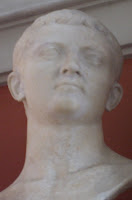
In republican ancient Rome banquets where just about the only place where a respectable patrician could be fickle and indulge in sensuality without damaging his carefully cultivated reputation. Once the men had been relaxed sufficiently by the wine, in the absence of family women and children, the noble Roman could indulge in the presence of salacious dancers, good-looking flute-players, and performers of various kinds and of both sexes. These activities were not considered serious and anything that occurred during a banquet would be conveniently brushed aside by the next day.
Banquet love affairs were in fact common, even if sexual relations hardly ever took place during the actual banquet. The attendees, despite all knowing each other's identity, would assume nicknames for the evening and dress up in exotic costumes - perhaps in a further effort to highlight the fickle and non-serious nature of any subsequent activities and separate it from everyday life. The poet Catullus for example, tells us of a certain Clodia who called herself Lesbia during these occasions. He subsequently wrote of her (approximate translation):
"You ask how many kisses will please me, oh Lesbia. As many as the grains of sand in the desert of Libya....as many as the number of the stars in a quiet night witnessing stolen loves of men. So many kisses dear Lesbia, they would be enough for your insane Catullus; so many kisses that gossiping eyes cannot count them and malicious people cannot put the evil-eye on...."
The kisses Catullus was alluding are generally thought to refer to the act of fellatio, however many banquets relied on their attendees using the power of suggestive talk and poetry to excite and scandalize each other while actual physical manifestation of these sexually charged verbal outpourings, during the cena (banquet) was indeed frowned upon and perceived as weakness in most patrician circles.







